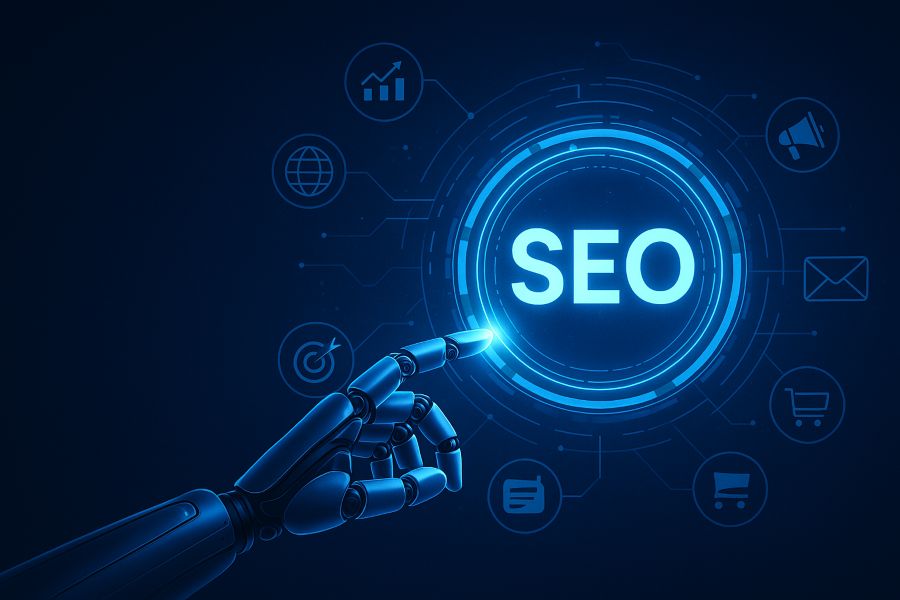Can Modern SEO Services Still Deliver Results in an AI-Driven Search Era?

Search engines aren’t what they used to be. The rise of AI-powered search models, such as Google’s Search Generative Experience (SGE) and OpenAI’s ChatGPT, has completely changed how users discover information online. Businesses and marketers now wonder: Can modern SEO services still deliver results in an era where artificial intelligence dominates search?
The short answer — yes, but only if SEO evolves with AI.
In this new digital landscape, SEO isn’t just about ranking pages; it’s about understanding how algorithms think, how users behave, and how AI filters relevance. Let’s break down what’s changed, what still works, and what strategies actually move the needle.
The Evolution of SEO in the Age of AI
From Keywords to Context
Before the rise of machine learning and natural language processing (NLP), SEO revolved around simple keyword targeting. Marketers stuffed pages with exact-match phrases hoping to rank higher.
Now, AI models like Google BERT and RankBrain understand the meaning behind words. They analyze context, search intent, and user satisfaction. That means modern SEO services must focus on semantic search optimization, ensuring every page answers user intent — not just includes popular keywords.
How AI Tools Changed the SEO Workflow
Today’s marketers rely on AI-driven SEO tools such as SurferSEO, MarketMuse, Frase, and Clearscope. These platforms use natural language algorithms to evaluate keyword relevance, readability, and topical depth.
But here’s the key difference — while AI assists with optimization, human creativity drives connection. Tools can predict what Google might favor, but only human writers can craft content that resonates emotionally and tells a brand’s story authentically.
The Problem — When AI Threatens Organic Reach
AI-Powered Answers Reducing Clicks
One of the biggest challenges facing SEO professionals is zero-click searches. With AI Overviews, featured snippets, and Bing Copilot, users often get answers directly on the results page without visiting a website.
This means fewer clicks — even for high-ranking sites. Businesses investing in SEO may feel their efforts are less impactful because traffic is siphoned away by search engines themselves.
Over-Optimization and Content Saturation
AI has made it easier than ever to generate content. Thousands of businesses now flood the internet with AI-written articles, leading to saturation and duplication. When everyone publishes similar “optimized” content, search engines prioritize E-E-A-T (Experience, Expertise, Authoritativeness, Trustworthiness).
Modern SEO must therefore emphasize original research, case studies, and firsthand insights to stand out. Algorithms can detect value through engagement metrics — how long users stay, whether they scroll, and if they interact with other pages.
The Solution — Human-Centered SEO with AI Support
Marrying Data with Creativity
The best-performing SEO strategies combine AI analytics with human intuition. Platforms like Google Analytics 4, Semrush, and Ahrefs reveal which queries bring users to a page. Then, writers craft content that expands on that intent — not just mirrors it.
For instance, instead of targeting “best running shoes,” a modern SEO specialist may write “how to pick the right running shoes for long-distance training,” offering more depth and experience-driven advice.
Focusing on User Experience (UX) and Core Web Vitals
Search algorithms now reward pages that load fast, adapt to mobile screens, and provide intuitive navigation. Google Core Web Vitals — metrics like Largest Contentful Paint (LCP) and Cumulative Layout Shift (CLS) — directly affect rankings.
That means SEO services must work closely with developers to improve site performance, visual stability, and accessibility. A fast, easy-to-use site sends a strong positive signal to both users and algorithms.
Content That Serves Real People, Not Robots
Even in an AI-driven era, storytelling and empathy remain SEO’s strongest tools. Algorithms learn from human behavior, so satisfying readers indirectly satisfies the machine.
A page that answers questions thoroughly, uses clear structure (H2, H3, bullets), and includes expert quotes will outperform keyword-heavy filler every time. The algorithm’s intelligence is simply mirroring human preference.
How AI Is Powering the Next Generation of SEO Tools
Predictive Analytics for Smarter Strategy
Modern AI tools like Moz Pro and SE Ranking now predict future search trends. They analyze historical data, user behavior, and algorithm updates to forecast what topics will gain traction.
This allows businesses to plan content calendars months ahead — targeting keywords that will be valuable tomorrow, not just today.
Automated Site Audits and Technical Fixes
AI also streamlines technical SEO. Tools can now scan websites for broken links, duplicate tags, and schema markup errors within seconds. Screaming Frog, Sitebulb, and DeepCrawl identify crawl issues faster than manual audits ever could.
But even with automation, human oversight remains crucial. A tool may detect an issue, but only a strategist can decide if fixing it aligns with long-term goals.
Measuring SEO Success in an AI Search Landscape
Beyond Rankings — Focus on Engagement and Conversions
In the past, ranking position was the ultimate SEO metric. But as AI diversifies the search experience, engagement metrics now carry more weight.
Metrics like:
- Click-through rate (CTR)
- Dwell time
- Pages per session
- Conversion rate
These determine whether your site delivers genuine value — not just visibility.
Leveraging AI for Reporting and Insight
AI-powered dashboards, like those in Data Studio or Looker, automate report generation. They translate complex data into clear visuals for marketers.
This shift means SEO experts can focus more on strategy and storytelling — explaining why trends happen, not just what they are.
Conclusion
So, can modern SEO services still deliver results in an AI-driven search era? Absolutely — when done intelligently.
AI isn’t replacing SEO; it’s reshaping it. The future belongs to marketers who can blend algorithmic precision with human empathy — who treat SEO as a long-term relationship with users, not a one-time trick for rankings.
Success in this new era means thinking like a machine but speaking like a human. That’s where real growth — and real results — will always come from.



